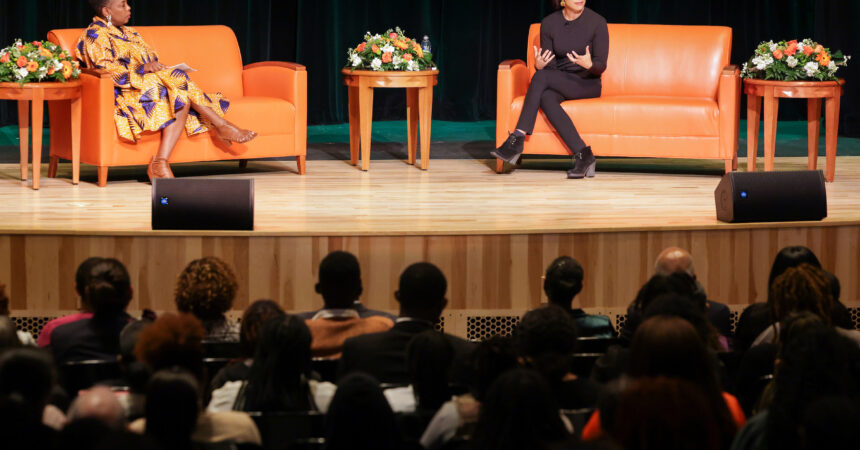
O’Brien’s discoveries reveal untold details in latest document of Rosa Parks’ life

Photo by Glenn Beil/FAMU Office of Communications
By Alexis Thornton
Special to the Outlook
Soledad O’Brien had reason enough to ignore the two women who suggested that she produce a documentary on civil right icon Rosa Parks.
So much had been said and written about Parks, whose role in the Montgomery Bus Boycott as part of the civil rights movement is well known.
Driven by her journalistic instincts, O’Brien decided to delve into what might have been left out Parks’ story. Months of digging turned up enough to produce one more documentary — “The Rebellious Life of Mrs. Rosa Parks.”
It has been getting a lot of air time, and O’Brien came to Tallahassee last Thursday night to shed light on how it all came together. She appeared at Lee Hall for FAMU’s annual Black History Month Conversation.
During the conversation, O’Brien disclosed that it didn’t take much for her to realize it was mandatory to put her company, Soledad O’Brien Productions, to work on the documentary.
The end result, which is currently streaming on Peacock, focuses primarily on the details of Parks’ life from childhood until she died in 2005 at age 92. O’Brien discussed clips from the film and even took questions from the audience.
What she discovered in addition to what’s already known about Parks makes the story even more compelling, O’Brien said.
“I hope everyone gets a chance to watch it,” O’Brien said. “I think she’s an inspiring person and I think that I was stunned at all that I did not know and so I think that anybody who watches will see stuff that will come to you as a surprise.”
For instance, the misinterpretation of what Park meant she said she was tired of standing. The film made it clear that Parks meant her tiredness had nothing to do with her feet and standing but instead she was tired of humiliation that she and other African Americans were experiencing.
Another misconception that the documentary exposed is how different Parks, despite her non-violence approach in her quest for justice, was from Martin Luther King, Jr. O’Brien discovered that her beliefs were more in line with that of Malcolm X.
Some people in the audience had already seen the documentary and used the conversation as an opportunity to hear Solidad’s views first-hand. Phyllis Walker, Associate Dean at FAMU’s College of Social Science, Arts and Humanities, was especially concerned about parts of the Parks story that were untold.
“I was already excited about coming to hear Soledad O’Brien but after I saw the documentary, I was even more excited about it.” Walker said. “It was very interesting to hear her talk about some of the things that I was wondering about, like why was this kept a secret, why did we not know much about her, and why was it that they tried to paint her to be this insignificant type of woman.”
O’Brian’s attention to details and her search for the unknown parts of Parks’ story made an impression on at least one aspiring journalist in the audience. Jasmine Butler, a senior broadcast journalism student, said she was inspired by the evening with O’Brien.
“I think the event was very beneficial, especially for upcoming journalists,” Butler said, adding that she was fascinated by the discoveries in the documentary. “That just goes to show Parks was one of the most influential people in the civil rights movement.”







